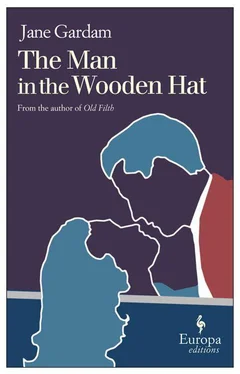“Is it the British Council?”
“Certainly not. It’s the riff-raff of Europe. The Sixpenny Settlers. We have to go. It’s polite. There’s to be wine.”
They arrived at the picnic where everyone was lolling about in the sun on what seemed to be an inland clifftop, though you could hear the sea far below. There was a long fissure on the plateau, stuffed full of flowers. There was a trickling sound of running water.
“I thought there were no streams on Malta,” she said.
“There is one. Only one,” said a languid man lying about nearby with a bottle of wine.
“We found it a year ago. Nobody knew of it. Yet it’s no distance from Valetta,” said somebody else.
“Ah,”—the languid man—. “We find that the island gets bigger and bigger.”
Some daughters, English schoolgirls in bathing dresses, neat round the thighs, were laughing and jumping over the rift in the rock. And then a shriek.
“What’s happening? What’s happening, Eddie?”
“I think they’re jumping the crack.”
Elisabeth ran across and lay on her stomach and looked down into the slit rock and its channel of flowers. It was less then a yard wide. The spot of emerald ocean below seemed distant as the sky above. “Oh, if they slip! If they slip!” Betty yelled out.
But the girls’ mothers were sitting smoking and examining their nails, and one of them called, “They won’t. Don’t worry.”
Then one girl did. A leg went down and she had to be hauled out fast. Everyone laughed, except Elisabeth, who again lay face-down. There was the notion that there was no time, nor ever had been, nor ever would be. She said, “Eddie, there’s a little beach down there. I can see breakers. I’m going down by the path.”
“If there is a path.”
“I’ll find one. I’ll go alone. Don’t follow me.”
They had not been apart since the wedding.
The languid man lying near with his wine bottle called out, “I say, you’re the barrister chap, aren’t you? I want to ask you something.”
“I’m off. I’ll see you down there, Edward. Come for me in one of the cars. Don’t hurry.”
“You’ll miss the picnic.”
“Good. Don’t drink too much. The road down will be screwy. Might be safer to dive through the crack.”
Edward turned grey. He strode over and grabbed her arm above the elbow.
“Let go! Stop it! You’re like a tourniquet! Edward !”
His eyes were looking at someone she had never met.
Then he let go of her arm, sat down on the stony cliff and put his hands over his face. “Sorry.”
“I should think so.”
“I went back somewhere. I was about eight.”
“Eight?”
“I killed someone—”
“Oh, Eddie, shut up. I’m going. . No, all right, then. All right . I won’t. Go and talk to that awful man. I’ll sit here by myself.”
“Something wrong?” the man called. “Honeymoon over? Something I said?”
“No,” said Edward.
“The war,” said the man. “POW, were you?”
“No. Were you?”
“God, no. Navy. Shore job. Ulcer. Left me low. Wife left too, thank God. Look.” He heaved himself up and came over to Edward. “Can you get me a job? In the Law line? Something like barristers’ clerk. No exams. Something easy.”
“Barristers’ clerks don’t have easy lives.”
“I’d really like just to stay here. On Malta. Do nothing. Just stay with our own sort.”
“I can’t stand this,” said Elisabeth. “Eddie, come with me down the cliff.” She stepped over the man and said, “Oh, drop dead, whoever you are.”
The streets around Victoria Station were dark and the taxi crawled along in a fog so dense that kerb-stones were invisible and even double-decker buses were upon you before you knew it. The cab driver stopped and started, and they sat silent until he said at last, “Ebury Street. Yes? Ten pounds.” He had brought them all the way from the airport, their luggage piled around them and under a strap on the front and on top on a frame. “Thanks, sir. Good luck, sir.”
She had never seen Edward’s part of London. She had never seen him in a house at all. Always it had been hotels and restaurants. She had no idea what his maisonette in Pimlico would be like, and still less now they had drawn up outside it in thick fog. She had always been with him in sunlight.
“I should carry you over my doorstep,” he said, “but it’s going to be a bit cluttered,” and he unlocked the front door upon an unpainted, uncarpeted stairwell with the yellow gloaming of the fog seeping in through a back window. There was an untrampled mess of mail about the floorboards and the smell of cats and an old-fashioned bicycle. Uncarpeted stairs went up and round a corner into more shadow.
“Home,” said Edward.
“Whose is the bike?”
“Mine.”
“ Yours? Can you? I mean I can’t see you riding a bike.”
“I ride it every Sunday morning. Piccadilly. Oxford Circus. Not a thing on the road. I’ll get you one.”
Upstairs there was a kitchen that housed one chipped enamel-topped table and a chair. Under the table were old copies of the Financial Times and the Daily Telegraph so densely packed that the table legs were rising from the floor. A rusty geyser hung crooked over a Belfast stone sink. Cupboard doors hung open against a wall. On the table, green fish-paste stood in an open glass jar and a teacup from some unspecified time. It had a mahogany-coloured tidemark inside it.
Edward smiled about him. “I have a cleaner but it doesn’t look as if she’s been in. I’ve never actually met her. I leave the money by the sink and it disappears — yes, it’s gone, so I suppose she’s been. I hope the bed’s made up. I’m not good at all this. I’m hardly ever here. There’s a laundry round the corner and an ABC for bread.”
“You live here! All the time? Alone? But Eddie, it’s so unlike you.”
“Oh, I don’t know. I’ve never been fussy.”
There was a Victorian clothes airer attached to the ceiling on a pulley with ropes that brought it up and down. Sitting on one of the rails of the airer was a rat.
Over the years this homecoming became one of Elisabeth’s famous stories, as she sat in Hong Kong at her rosewood dining table with its orchids and silver and transparent china bowls of soup. Contemporaries discussing post-war London. Elisabeth became glib, inspiring like memories among guests who were all of a certain age. They joked proudly of the drabness of that fifties — even sixties — London; the insanity of the National Health Service (“free elastoplast !”), the puritanical government. Elisabeth, always pleasant, never joined in about politics. She revered the British Health Service, and turned the conversation to the London she came to as a bride, to Edward’s unworldliness in seedy Pimlico, his hard work, his long hours in Chambers. But when she told the homecoming story, which became more colourful with the years, she could not decide why she somehow could never include the rat.
She had screamed, run from the kitchen, down the stairs and out into the fog, and stood shaking on the pavement, Edward following her and shouting, “Betty — for God’s sake, there were rats on Malta. Plague rats. And Hong Kong. And what about Bhutan and the snakes coming up the bath pipes?”
“We never saw one.”
“What about the Camp in Shanghai?”
“That was different. And we kept the place clean. We’ve got to leave, Eddie. Now .”
“You don’t know how hard it is to find anywhere. Even one room. Everywhere is flattened. And Ebury Street is SW1. It’s a good address on writing paper.”
Читать дальше












